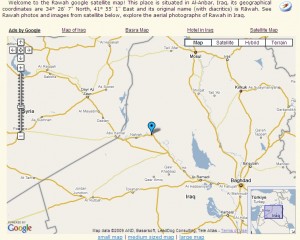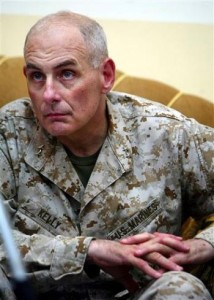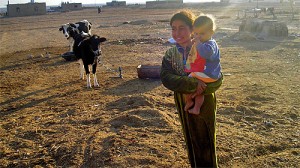Ideologues and Counterinsurgency
BY Herschel SmithAt Blackfive, Uncle Jimbo (Jim Hanson) swerves way outside his lanes and lampoons an article penned by Colonel Gian Gentile, Professor of History at West Point and veteran of Operation Iraqi Freedom. Says Jim:
Crush points out, while nodding sagely in agreement, a piece by COL Gian Gentile bemoaning the idea that an insurgency should be fought using a counterinsurgency strategy. I think it bears a look at COL Gentile and his deep and abiding distaste for COIN prior to taking him too seriously. There is plenty to debate about the best way to counter an insurgency, but if you are going to debate you need an open mind. That is lacking here as the rhetoric in COL Gentile’s piece clearly shows.
Jim continues:
Did I miss something, I thought that a switch to COIN was one of the major factors in our victory in Iraq. (sic) even (sic) the Anbar Awakening was conditioned upon our employing a strategy that was focused on safeguarding the populace and helping the Iraqis do just that …
The fact that I am quite familiar with COL Gentile and his opinions regarding COIN would seem to argue against his feeling that there was no public debate about how to deal w/ insurgents. It seems more likely that since he lost those public debates he is now bitter. The Army needed a doctrine to deal with the active insurgencies we were facing and COL Gentile was definitely heard, he simply didn’t prevail. We continue to evaluate the effectiveness of the particular tactics that make up this doctrine and empirical evidence from the battlefield is examined to facilitate that. it may seem counter-intuitive for an Army to have a sweetness & light side, but it remains a fact that you can’t kill your way out of every problem.
Gentile’s article is entitled Time for the Deconstruction of Field Manual 3-24, published by National Defense University Press. It’s a fairly short article, but several money quotes are given below.
Of course, leaders in war must be held accountable for their actions and what results from them. But to use as a measuring stick the COIN principles put forth in FM 3–24 with all of their underlying and unproven theories and assumptions about insurgencies and how to counter them is wrong, and the Army needs to think hard about where its collective “head is at” in this regard.
It is time for the Army to debate FM 3–24 critically, in a wide and open forum. The notion that it was debated sufficiently during the months leading up to its publication is a chimera. Unfortunately, the dialogue within defense circles about counterinsurgency and the Army’s new way of war is stale and reflects thinking that is well over 40 years old. In short, our Army has been steamrollered by a counterinsurgency doctrine that was developed by Western military officers to deal with insurgencies and national wars of independence from the mountains of northern Algeria in the 1950s to the swamps of Indochina in the 1960s. The simple truth is that we have bought into a doctrine for countering insurgencies that did not work in the past, as proven by history, and whose efficacy and utility remain highly problematic today. Yet prominent members of the Army and the defense expert community seem to be mired in this out-of-date doctrine.
Gentile goes on to cite several historical examples of counterintuitive effects in warfare, and then argues for the deconstruction of FM 3-24 with more openness to dialogue and debate than when it was first penned.
We will return to Gentile’s points later. But Jim Hanson makes a blunder so obvious that it must be addressed before we can go any further. He says “even (sic) the Anbar Awakening was conditioned upon our employing a strategy that was focused on safeguarding the populace and helping the Iraqis do just that.” Anbar was won by switching strategy to a population-centric COIN model upon the advent of General David Petraeus, or so Hanson apparently believes.
This is approximately the same narrative that I heard Bill O’Reilly reiterate: “General Petraeus was able to convince the tribes in Iraq to oppose AQI, and that’s why the surge succeeded.” It’s the narrative for the population, for the simpletons who need a short synopsis embodied in heroic proportions and in a single individual. Americans love their generals, and their exploits tend towards the mythical.
The reality in the Anbar Province was much dirtier, much bloodier, much harder and much more costly than this narrative portrays. The U.S. Marine Corps suffered more than a thousand Marines who perished in Anbar, and many thousands more who were maimed. They didn’t die because of improper strategy, and the things that happened in Anbar were set into motion long before February 10, 2007 when Petraeus took over Operation Iraqi Freedom.
Colonel Sean MacFarland took Ramadi in May/June of 2006. He observed that:
“The prize in the counterinsurgency fight is not terrain,” he says. “It’s the people. When you’ve secured the people, you have won the war. The sheiks lead the people.”
But the sheiks were sitting on the fence.
They were not sympathetic to al-Qaeda, but they tolerated its members, MacFarland says.
The sheiks’ outlook had been shaped by watching an earlier clash between Iraqi nationalists — primarily former members of Saddam Hussein’s ruling Baath Party — and hard-core al-Qaeda operatives who were a mix of foreign fighters and Iraqis. Al-Qaeda beat the nationalists. That rattled the sheiks.
“Al-Qaeda just mopped up the floor with those guys,” he says.
“We get there in late May and early June 2006, and the tribes are on the sidelines. They’d seen the insurgents take a beating. After watching that, they’re like, ‘Let’s see which way this is going to go.’ “
But his approach was heavily kinetic.
Col. Sean MacFarland arrived in Ramadi as commander of the U.S. 1st Brigade, 1st Armored Division. His four Army and Marine battalion commanders built small outposts throughout the city, from which troops patrolled every block. When al Qaeda in Iraq challenged this intrusion, the Americans fought back with overwhelming firepower. Unlike other American commanders at the time, who sought to minimize their losses, Col. MacFarland did not relent when American casualties mounted. “My measure of effectiveness would not be low friendly casualties,” he told Mr. Michaels. “My measure of success would be defeating the enemy.”
Mr. Michaels explains that Col. MacFarland’s military operations helped to convince Sattar that the Americans—then at a low point in their effort to reshape Iraq—would persist and prevail in Anbar Province. So did Col. MacFarland’s personal diplomacy. “Instead of telling [the Iraqis] that we would leave soon and they must assume responsibility for their own security,” Col. MacFarland recalled, “we told them that we would stay as long as necessary to defeat the
terrorists.”
In Haditha, it was a variant of the same story. Sand berms were used to quell the flow of insurgents into Haditha from the Syrian border, but in a pattern that was to play out all over Anbar, a local strongman helped to control the population, a former officer in the Saddam Hussein army known simply as Colonel Faruq, with the power and charisma to bring the town to heel.
In Al Qaim AQI had the tribes beaten down until the U.S. Marines engaged in enough heavy kinetics that the tribes wanted to ally themselves with the Marines. After that point, a local strongman named Abu Ahmed helped to police the population.
By early 2007 both foreign fighters and indigenous insurgents had been driven from Al Qaim, Ramadi and Haditha, and they had landed squarely in Fallujah. When the 2/6 Marines arrived in Fallujah in April of 2007, they had to construct some of Forward Operating Base Reaper while laying on their backs and passing sand bags over their bodies (to eventually be used for walls) because of the constant fire coming their way. The previous unit had begin patrolling only at night because of snipers, and because they didn’t own the daytime, IEDs controlled their night time patrols, thus relegating them to sitting in their FOBs for the last three weeks of their deployment awaiting relief. The population was so allied with AQI that their children were sent out with black balloons to demarcate patrol locations so that insurgent mortars could target the U.S. Marines (even at grave risk to the children).
Operation Alljah was started, and the Marines went in hard (I am not linking the Wikipedia link on Operation Alljah because of know with certainty that much of the data is simply erroneous or mistaken and incomplete. The link is essentially worthless). HMMWVs with loud speakers were deployed to every Mosque in the city bellowing U.S. positions and propaganda. Heavy and aggressive patrols were conducted, and heavy fires were employed any time any insurgent used weapons against the Marines, including everything from fire team and squad level weapons to combined arms.
Policing of the population was aggressive, ubiquitous and around the clock. In order to address the vehicle-borne IED problem, the use of automobiles was prohibited within Fallujah proper until such time as security was established. Concrete barricades were set up throughout the city, and census data was taken on the entire population, much of it at night so that the population was awakened to Marine presence in their homes.
Many local insurgents were killed, and also even more foreign fighters. Insurgents from Chechnya, men with skin “as black as night,” and even “men with slanted eyes” were killed in Fallujah in the summer of 2007. The city was locked down and the atmosphere made very uncomfortable for the population – until, that is, they began cooperating with the U.S. Marines Corps.
I know many more things that I simply cannot share concerning this operation, but things that I have communicated to Colonel Gian Gentile. Suffice it to say that Colonel Gentile isn’t frightened by invoking Iraq as an example of proper counterinsurgency strategy. Whatever the incredibly intelligent General David Patraeus did for Baghdad and beyond, The Anbar Narrative is one of U.S. Marine Corps force projection. But it didn’t stay that way. Eventually, the warrior scholar emerged, and Lt. Col. William F. Mullen (now Colonel Mullen) was at city council meetings discussing power supply and trash collection. Eventually, also, the concrete barricades were removed.
Colonel Gian Gentile isn’t a proponent of jettisoning counterinsurgency doctrine, despite what Jim Hanson believes. Gentile knows that there are phases to campaigns, and one particular paper that has been influential in my thinking (given to me by Gentile) is from The Journal of Strategic Studies, entitled The Malayan Emergency as Counter-Insurgency Paradigm. One money quote reads as follows:
It is naive to think that the blend of policies found at the optimisation phase of successful insurgencies will work well at the outset of a conflict. Hence, though measures to win ‘hearts and minds’ have their place in all phases, if only to dampen the effects of collateral damage and hatred of the security forces, in Malaya the emphasis in the critical 1950-52 phase was on getting effective command, small unit patrols bolted onto areas, and population control and security.
This campaign followed the example of phased counterinsurgency, with hard tactics and carrots and sticks employed at the right time and in the right degree. The problem Gentile is addressing pertains to the unsubstantiated belief that everywhere, at all times, under all circumstances, and without exception, the center of gravity of a counterinsurgency campaign is the population. I have also addressed this in Center of Gravity Versus Lines of Effort in COIN. I envision multiple lines of effort, Gentile envisions a situation in which the troops on the ground discover the center of gravity if there is one, both views variants on the same theme.
Either way, Gentile is right, and the doctrines of FM 3-24 are in need of re-evaluation. Jim Hanson has done a disservice to the practice of warfare by so quickly and disrespectfully dismissing Gentile’s arguments. Moreover, he has come unarmed to an intellectual battle with a Jedi Master named Gentile. It’s embarrassing for Hanson, even if he is too stolid to know it. Colonel Gentile is discussing population-centric counterinsurgency as an exclusive use procedure, and demurring, while Hanson is discussing – well, I don’t know what. By my Google mail search, I have exchanged literally hundreds of e-mails with Colonel Gentile on the issue of counterinsurgency. What has Jim Hanson done to ensure that he has the proper understanding of Gentile’s position? He doesn’t tell us. Pity.
The question concerns the way in which to conduct counterinsurgency in the unfortunate advent of the situation in which we have no other choice. In this, Gentile is sipping Merlot and smoking fine cigars in the back room where the decisions are being made, while Hanson is shouting and throwing down with his boys drinking PBR in the front room. Occasionally, the raucous behavior spills over to the back room until the MPs arrive. I’ll side with Gentile, thank you.
Postscript: See also Extracting Counterinsurgency Lessons: The Malayan Emergency and Afghanistan






